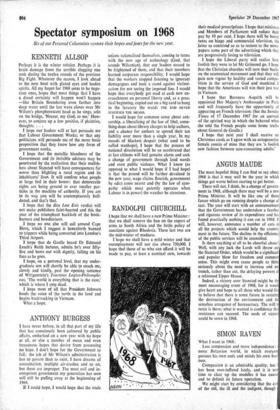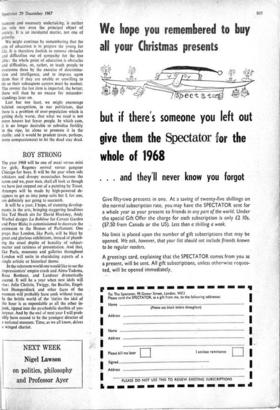Spectator symposium on 1968
Six of our Personal Columnists venture their hopes and fears for the new year.
KENNETH ALLSOP
Perhaps it is the winter solstice. Perhaps it is brain damage from the terrible slugging one took during the twelve rounds of the previous Big Fight. Whatever the reason, I look-ahead to the next bout with glazed eyes and leaden spirits. All my hopes for 1968 seem to be nega- tives ones, hopes that most things that I have a dread certainty will happen won't happen —like Britain floundering even further into deep water until the last wave closes over Mr Wilson's phosphorescent head as he sings, solo on the bridge, 'Nearer, my God, to me.' How- ever, to conjure up a few positive, if Plaintive, thoughts.. .
I hope our leaders will at last persuade me that Labour Government Works; or that any politicians will persuade me of the more basic proposition that they know how any form of government works.
I hope that the metallic blandness of the Government and its invisible advisers may be penetrated by the realisation that their mulish- ness about Stansted will have consequences far worse than blighting a rural region and its inhabitants' lives. It will confirm what people at large feel in their bones: that detnocratic rights are being ground to ever smaller par- ticles in the machine of authority. If you are in its way you will be contemptuously bull- dozed, and that's that.
I hope that the dire Last Exit verdict will not make publishers faint-hearted and this the year of the triumphant backlash of the book- burners and bowdlerisers.
I hope no one else will sail around. Cape Horn, which I suggest is henceforth banned to trippers while being converted into London's Third Airport.
I hope that de Gaulle heard Dr Edmund Leach's Reith lectures, admits• he's over fifty- five and bows out with dignity, falling on his face as he goes.
I hope, on a personal level, that my under- graduate son will shortly be able to coach me, slowly and kindly, past the opening sentence of Wittgenstein's Tractatus Logico-Philosophi- cus, 'The world is everything that is the case,' which is where I stop dead.
I hope most of all that President Johnson heeds the voice of the turtle in the land and begins backtracking in Vietnam.
What a hope.
ANTHONY BURGESS
I have never before, in all that part of my life that has consciously been coloured by public affairs, embarked on a new year with no hope at all, or else a number of mean and even treasonous hopes that derive from possessing no hope. I don't hope for the Government to fall: the job of Mr Wilson's administration is less to govern than to exist. I have dreams of assassination, multiple air-crashes and so on, but these are improper. The most evil and in- competent government my generation has seen will still be puffing away at the beginning of 1969.
If I could hope, I would hope that the trade unions rationalised themselves, coming to terms with the new age of technology (God, that sounds Wilsonian), that our leaders ceased to be frightened of them, and that their, members learned corporate responsibility. I would hope that the workers stopped listening to ignorant demagogues and took a stand against victimi- sation for not toeing the imposed line. I would hope that everybody got mad at each new en- croachment on personal liberty and, as a prac- tical beginning, copied out on a big card to hang in the lavatory the words THE END NEVER JUSTIFIES THE MEANS.
I would hope for common sense about cen- sorship, a-liberalising of the law of libel, some- thing done about library charges to help authors, and a chance for authors to spread their tax liability over more than a single year. In my moods .of blackest despair (what used to be called wanhope), I hope that the process of national dissolution will be so accelerated that at last citizens will feel genuine alarm and seek a change of government through loud words and even public violence. What I know (as opposed to what I would hope if I had hope) is that the pound will be further devalued in the new year, wage claims flourish, government by edict come nearer and (by the law of sym- pathy which most patently operates when Labour is in power) the weather be atrocious.
RANDOLPH CHURCHILL
I hope that we shall have a new Prime Minister: that we shall remove the ban on the export of arms to South Africa and the futile policy of sanctions against Rhodesia. These last two are the mid-winter of madness.
I hope we shall have a mild winter and that unemployment will not rise above 750,000. I hope that those of us who can afford it will be made to pay, at least a nominal sum, towards their medical prescriptions. I hope that ministers and Members of Parliament will reduce their pay by 10 per cent. I hope there will be heavy taxes on bingo and commercial television, the latter so contrived so as to restore to the news- papers some part of the advertising .which they are progressively losing to television.
I hope the Liberal party will realise how foolish they were to let Mr Grimond go. I hope that the Christian churches will turn their backs on the ecumenical movement and that they will gain new vigour by healthy and varied- compe- tition in the service of God and mankind. I hope that the Americans will win their just war in Vietnam.
I hope that Baroness Asquith will be appointed Her Majesty's Ambassador in Paris and will frequently have the opportunity of appearing on French television. (See the Sunday Times of 17 December 1967 for an account of the spirited way in which she, behaved when she told the French people some home truths about General de Gaulle.) I hope that next year I .shall receive no Christmas cards as I agree with an octogenarian female cousin of mine that they are 'a foolish new fashion between non-consenting adults.'
ANGUS MAUDE
The most hopeful thing I can find to say about 1968 is that it may well be the year in which things got worse before starting to get better.
There will not, I think, be a change of govern- ment in 1968, although there may well be a new Prime Minister. It will be like one of those farces which go on running despite a change of cast. The year will start with an announcement that the Government has undertaken a fearless and rigorous review of its expenditure and has found practically nothing it can cut in 1968. It will, however, announce a number of cuts in all the projects which would help the country most in the future. The decline in the 'efficiency of the public services will be intensified.
Is there anything at all to be cheerful about? Well, with any luck the Lords will throw out the Stansted Order, which would be a significant and popular blow for freedom and common sense. This might even cause people to think seriously about the need to increase and en• trench, rather than cut, the delaying powers of a reformed Upper House.
Indeed, a victory over Stansted might be the most encouraging event of 1968, for it wont give heart and hope to all those who would lik to believe that there is some future in resisting the destruction of the environment and th senseless arrogance of bureaucracy. The will t resist is there; what is wanted is confidence thai resistance can succeed. The seeds of victo could be sown in 1968.
SIMON RAVEN
What I want in 1968: Less compassion and more independence: more Balzacian world, in which everyon pursues his own ends and minds his own busi ness.
Compassion is an admirable quality; but has been over-inflated lately, and it is no time to clear up the muddles -it has caus and to delimit its future 'operation. We might start by considering that the ca of the old, the ill and the indigent, though
humane and necessary undertaking, is neither the sole nor even the principal object of society. It is an incidental matter, not one of priority.
We might continue by remembering that the aim of education is to prepare the young for life. It is therefore foolish to remove obstacles and difficulties out of sympathy for the less able: the whole point of education is obstacles and difficulties, or, rather, to teach people to overcome these by the exercise of determina- tion and intelligence, and to impress upon them that if they are unable or unwilling to do so their subsequent careers must be modest. The sooner the last item is imparted, the better; there will then be no excuse for misunder- standings later on.
Last but not least, we might encourage belated recognition, in our politicians, that there is a problem of over-population which is getting daily worse, that what we need is not more houses but fewer people. In which case, it is no longer desirable to subsidise fertility in the ripe, let alone to promote it in the sterile; and it would be prudent (even, perhaps, more compassionate) to let the dead stay dead.
ROY STRONG
The year 1968 will be one of maxi versus mini for girls, Regency revival versus gangster Chicago for boys. It will be the year when side whiskers and droopy moustaches become the norm and we, poor men, shall all look as though we have just stepped out of a painting by Tissot. Attempts will be made by high-powered de- signers to get us into jump suits but I, for one, am definitely not going to succumb.
It will be a year, I hope, of stunning develop- ments in the arts, bringing staggering headlines like Ted Heath sits for David Hockney, Andy Warhol designs La Boheme for Covent Garden and Peter Blake is commissioned to decorate the extension to the Houses of Parliament. One prays that London, like Paris, will be blest by great and glorious exhibitions, instead of plumb- ing the usual depths of banality of subject- matter and tattiness of presentation. And that, like Paris, museums and galleries throughout London will unite in elucidating aspects of a single artistic or historical theme.
In the saleroom world one would like to see the impressionists' empire crash and Alma-Tadema, Rosa Bonheur, and Landseer dramatically ascend. It will be a year when new idols will rise: Julie Christie, Twiggy, the Beatles, Engel- bert Humperdinck and other faces of the moment will probably have sunk without trace. In the brittle world of the 'sixties the idol of the hour is as expendable as all the other in- junk, tipped into the pyschedelic dustbin of yes- teryear. And by the end of next year I will prob- ably have ceased to be the youngest director of a national museum. Time, as we all know, drives a winged chariot.











































 Previous page
Previous page